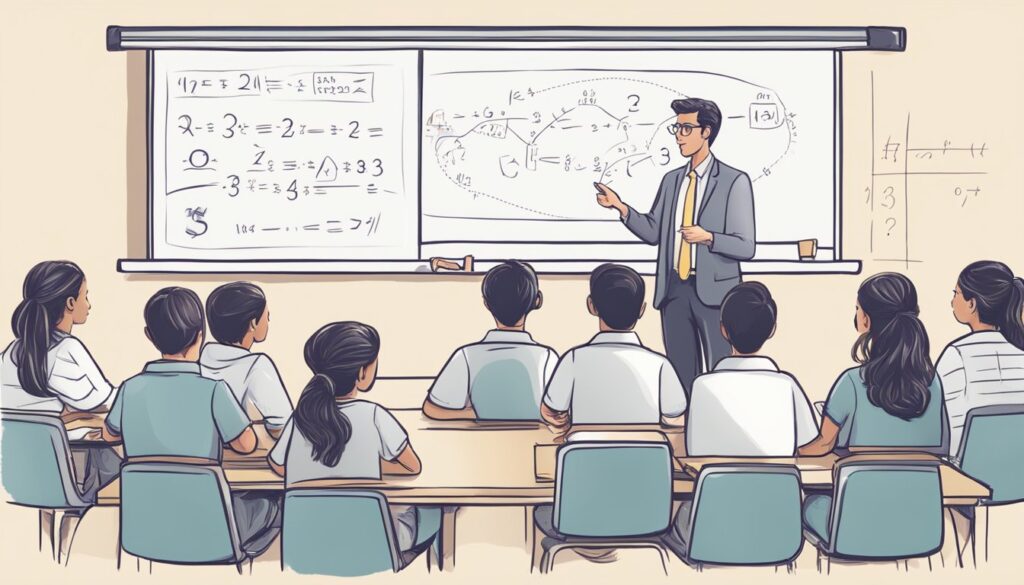110+ Math Teacher Interview Questions: Top Inquiries for Aspiring Educators

Interviewing for a math teaching position requires more than just a solid understanding of mathematical concepts and theories. Your ability to effectively communicate complex ideas and engage students in learning plays a crucial role in your success as an educator. This post covers 110+ math teacher interview questions for aspiring educators.
Consequently, a math teacher interview often encompasses a range of questions from your teaching philosophy to the specifics of your instructional strategies.

During the interview, you may be asked to demonstrate how you plan lessons, assess student understanding, and foster a positive learning environment.
Your potential employers are looking for evidence of your expertise in the subject matter, but also your creativity in delivering content and your skills in classroom management.
It’s important for you to articulate clear methods for how you make math accessible and engaging for all students, including those who may traditionally struggle with the subject.
Page Contents
- 1 Understanding the Role of a Math Teacher
- 2 Background Questions for Math Teacher Interview
- 3 10 Tips to Prepare for Math Teacher Interview
- 4 List of 100 Interview Questions for Math Teacher
- 5 Anticipating 10 Common Math Teacher Interview Questions
- 6 Closing Remarks Math teacher interview Questions
- 7 To sum up
Understanding the Role of a Math Teacher

Your role as a math teacher is multifaceted and crucial in shaping the way students perceive and interact with mathematics. You are responsible for creating a positive learning environment, fostered by your genuine enthusiasm for the subject. Your goal is to impart the importance of math in everyday life and to build a foundation for future learning.
- Instructional Expertise:
- Develop and deliver clear lesson plans.
- Tailor instruction to diverse learning styles.
- Engagement:
- Encourage student participation and curiosity.
- Utilize a variety of teaching tools and techniques.
- Assessment:
- Regularly evaluate understanding through varied assessments.
- Provide timely and constructive feedback.
- Support:
- Offer additional help to students struggling with concepts.
- Design interventions to enhance learning outcomes.
The emphasis on importance of math requires you to connect abstract ideas to real-world applications. By doing so, you demystify mathematical concepts and emphasize their relevance, ensuring that your students can appreciate the value of math in their future careers and personal lives.
Your contribution goes beyond teaching formulas; it’s about inspiring a generation to think critically and solve problems efficiently.
Background Questions for Math Teacher Interview

When preparing for an interview for a math teacher position, you can expect questions about your educational and professional background. These are designed to gauge your qualifications and experience.
Below is a list of common background questions with concise answers to help you get ready.
- What is your highest level of education in mathematics?
I hold a Master’s degree in Mathematics Education. - Can you walk me through your math teaching experience?
I’ve taught high school calculus for five years and algebra for three years at XYZ High School. - Are you familiar with the latest math education technologies?
Yes, I am proficient in using smartboards, math software like GeoGebra, and virtual learning environments. - How do you keep up with the current math education trends?
I regularly attend professional development workshops and read the latest math education journals. - Describe a successful teaching strategy you have implemented.
I incorporate blended learning by using a mix of traditional teaching and digital tools to enhance student engagement. - What math courses have you taught previously?
I’ve taught Algebra I & II, Geometry, Trigonometry, Calculus, and Statistics. - What certifications do you hold in math education?
I am a state-certified math teacher with an endorsement in secondary math education. - Can you provide examples of how you assess student learning?
I use a variety of assessments, including quizzes, collaborative projects, and formative assessments through educational apps. - How have you contributed to your previous school’s math department?
I led the initiative to revise the math curriculum to better align with Common Core standards. - Have you ever taught students with diverse learning needs?
Yes, I’ve successfully adapted my teaching methods to accommodate students with IEPs and 504 plans.
10 Tips to Prepare for Math Teacher Interview

- Familiarize Yourself with Common Questions
- Be prepared for questions such as: How do you engage students who struggle with math? Answer by highlighting your strategies that cater to different learning styles.
- Understand Curriculum Standards
- Know the local and national curriculum standards. These dictate what students should learn and your interviewer will expect you to align your teaching with them.
- Develop a Clear Math Teaching Philosophy
- Be able to articulate your teaching philosophy concisely, showing understanding of various teaching methodologies.
- Prepare to Showcase a Lesson Plan
- Bring a lesson plan to the interview that demonstrates your ability to plan and structure a math lesson effectively.
- Showcase Your Subject Knowledge
- Be ready to solve common math problems. You might be tested on your subject knowledge during the interview.
- Explain Your Classroom Management Techniques
- Have clear examples of how you manage a classroom and maintain a productive learning environment.
- Highlight your Use of Technology
- Discuss how you incorporate technology into lessons to facilitate learning and make mathematics engaging.
- Practice Your Answers
- Practice delivering your answers out loud. This helps to ensure that you convey your thoughts clearly and confidently.
- Discuss Assessment Strategies
- Explain how you assess students’ understanding and mastery of math concepts, ensuring it aligns with curriculum standards.
- Present Professional Development Experiences
- Show your commitment to personal growth by discussing any additional training, workshops, or courses you’ve undertaken.
List of 100 Interview Questions for Math Teacher

- How do you stay updated on the latest math education trends?
- Can you explain your experience with curriculum development?
- Describe your classroom management style.
- Illustrate how you make math accessible to various learning styles.
- What strategies do you use to engage students who struggle with math?
- Share an anecdote where you helped a student improve in math.
- What do you enjoy most about teaching math?
- How do you incorporate technology into your math lessons?
- Discuss the importance of critical thinking in math education.
- How do you differentiate instruction to meet the needs of all students?
- What’s your approach to assessing students’ understanding?
- How do you address the different skill levels in your class?
- What’s your strategy for preparing students for standardized tests?
- How do you handle a student who disrupts the class?
- Can you give an example of an innovative math lesson you’ve taught?
- What’s your philosophy on homework and its role in learning math?
- Describe a time when you had to adapt your teaching to unexpected circumstances.
- How do you handle academic dishonesty?
- Can you detail your experiences with collaborative teaching?
- What’s your strategy for communicating with parents about their child’s progress?
- How do you incorporate real-world problems into your math lessons?
- Describe your experience with project-based learning in math.
- What are your thoughts on group work in math classes?
- How do you support students in developing a growth mindset about math?
- How do you foster a love for math in your students?
- Share your experience with teaching a particularly challenging math concept.
- How do you adapt your teaching for gifted students?
- What do you do when a student is not meeting grade-level expectations?
- How do you assist students with math anxiety?
- What are your strategies for teaching abstract math concepts?
- Discuss your involvement with professional math organizations.
- How do you collaborate with other teachers to improve student learning?
- What professional development opportunities have you found most valuable?
- Describe a time when you received constructive feedback and how you applied it.
- How do you contribute to your school’s math department?
- Are you familiar with any math-specific software or apps?
- How do you make sure students use technology responsibly?
- Can you share how you’ve used an LMS for your math classes?
- What online resources do you rely on for supplementary math materials?
- How do you maintain a balance between traditional and digital teaching methods?
- How do you align your teaching with state/national math standards?
- Have you ever had to modify your teaching due to curricular changes?
- Describe your experience with interdisciplinary teaching involving math.
- How do you approach teaching math vocabulary and terms?
- What math courses have you taught or are most comfortable teaching?
- How do you motivate students who don’t show an interest in math?
- Could you share your techniques for managing a competitive classroom environment?
- How do you encourage students to participate in math competitions or clubs?
- What extracurricular activities do you think complement math education?
- How do you celebrate your students’ achievements in math?
- Describe how you use formative assessments in your teaching.
- What is your approach to providing feedback on student work?
- How do you ensure your assessments are fair and objective?
- Can you discuss your experience with peer assessments?
- How do you handle re-teaching when students don’t grasp a concept after the first lesson?
- How do you create an inclusive classroom environment in your math classes?
- What are your experiences with teaching in diverse cultural settings?
- How do you prevent and address biases in the classroom?
- Discuss how you manage different paces of learning within a single class.
- What role does student dialogue play in your math classes?
- Highlight an accomplishment in your teaching career that you’re most proud of.
- Discuss how you’ve applied your math subject knowledge in practical ways.
- What have you learned from a challenging experience in your teaching?
- How have you contributed to your school outside of classroom instruction?
- What professional achievements in math education have you attained?
- What are your continuing education aspirations or plans?
- How do you integrate new mathematical research into your teaching?
- Discuss a recent math education article or book you’ve read and found insightful.
- What have been the most significant changes in math education during your career?
- How do you envision the future of math education?
- Walk me through your process for planning a typical math lesson.
- How do you assess the effectiveness of your lesson plans?
- What’s your experience with co-teaching or team teaching?
- How do you incorporate student feedback into your lesson planning?
- Describe how you pace your curriculum over the academic year.
- How do you guide students in setting academic and personal goals?
- Discuss your role in student advising and mentorship.
- How do you support students during transitions (e.g., middle school to high school)?
- Can you share strategies for supporting students during remote or hybrid learning?
- What methods do you use to build students’ study and test-taking skills?
- What classroom rules do you establish, and how do you enforce them?
- Discuss a time when you dealt with behavioral issues effectively.
- How do you manage distractions in the classroom?
- What are your thoughts on zero-tolerance policies in school?
- How do you include socio-emotional learning in math education?
- How do you ensure that your teaching materials represent diverse perspectives?
- What’s your approach to equity in grading practices?
- How do you accommodate students with special needs in your math classes?
- Discuss how you would support English Language Learners in math.
- What steps do you take to ensure fairness in student opportunities?
- What do you expect from your school’s administration to support your teaching?
- How do you handle conflicts with colleagues or administration?
- Describe a professional weakness and how you’re working to improve it.
- What measures do you take to maintain student confidentiality?
- How do you balance your workload, including teaching, grading, and planning?
- What qualities do you think are essential for a math teacher?
- How does your passion for math translate into your teaching?
- How do you stay energetic and positive in the classroom?
- Can you give an example of when your perseverance made a difference in a student’s education?
- Why do you believe you are the right fit for our school’s math department?
Anticipating 10 Common Math Teacher Interview Questions
When preparing for your math teacher interview, be ready to discuss both your teaching philosophy and your ability to effectively teach math concepts. You will likely encounter the following questions:
- How do you approach teaching a difficult math concept? Your approach might include breaking down the concept into smaller, manageable parts and using hands-on materials or visual aids to enhance understanding.
- Describe your experience with integrating technology into the math classroom. Mention specific software, online resources, or devices you have utilized to enhance learning, like graphing calculators or interactive whiteboards.
- What strategies do you use to engage students who are struggling in math? Highlight differentiation, providing additional resources, or one-on-one tutoring sessions to support students at different levels.
- How do you assess a student’s understanding of a math topic? Discuss a variety of assessment methods such as quizzes, student-led teaching, or project-based assessments to gauge understanding.
- Can you give an example of a lesson plan that effectively meets common core math standards? Outline a specific lesson, detailing how it aligns with standards and engages students in critical thinking.
- What methods do you use to make math accessible and fun for all students? Consider mentioning interactive math games, real-life application projects, or collaboration to show how you make math relatable.
- How do you tailor your teaching to work with both advanced students and those who need extra help? Focus on differentiated lesson plans, offering advanced problem-solving for gifted students while providing remediation for others.
- How would you involve parents in their child’s math education? You could talk about regular communication through newsletters, providing at-home math resources, or organizing parent workshops.
- What professional development opportunities have you pursued to improve your math teaching skills? List conferences, workshops, additional certifications, or continual learning courses you’ve taken.
- Describe a time when you had to adapt your math teaching approach to a virtual environment. Share experiences with virtual learning platforms, maintaining student engagement, and assessing students’ progress online.
Closing Remarks Math teacher interview Questions

In this final phase of the interview process, your goal is to leave a lasting impression that cements your candidacy as a math teacher. The energy and enthusiasm you express for teaching math can significantly influence the interview outcome.
Expressing Your Passion for Teaching Maths
When concluding your interview, clearly articulate your dedication to teaching math. Your verbal and nonverbal communication should demonstrate a deep enthusiasm for both the subject of mathematics and the opportunity to educate students at the elementary or secondary level.
- Be Specific: Use maths vocabulary to communicate your passion. For example, talk about the joy of exploring algebraic expressions or geometric theorems with your students.
- Use Practical Examples: Share specific instances from your teaching experience where your enthusiasm for math positively impacted your students’ learning. For instance, recount a time when your excitement about a math concept led to a breakthrough moment for a struggling student.
- Showcase Genuine Interest: Convey how your desire to teach math extends beyond the classroom. Mention after-school clubs, math competitions, or tutoring sessions you have led or would like to initiate.
Remember, the way you discuss your experiences and aspirations as a math teacher speaks volumes to interviewers. Your fervor for the discipline should be palpable, leaving no doubt about your suitability for the role.
To sum up

During your math teacher interview, it’s important to showcase your strengths and enthusiasm for teaching mathematics. Balance your knowledge of mathematical concepts with proven teaching strategies.
Key Interview Preparation Areas:
- Subject Proficiency: Ensure your understanding of mathematical concepts is thorough.
- Teaching Methodologies: Be prepared to discuss your approach to teaching math, including how you differentiate instruction and assess student understanding.
- Classroom Management: Have clear examples of your classroom management style and how you maintain a conducive learning environment.
- Technology Integration: Share your experience with educational technology and how you use it to enhance math learning.
Prior to the interview, review common curriculum standards and be ready to discuss how you align your lessons with these benchmarks. Your preparation and ability to communicate effectively are key to making a strong impression.







